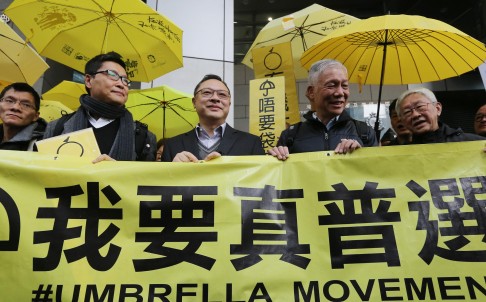
Occupy Central
Occupy Central is a civil disobedience movement which began in Hong Kong on September 28, 2014. It calls on thousands of protesters to block roads and paralyse Hong Kong's financial district if the Beijing and Hong Kong governments do not agree to implement universal suffrage for the chief executive election in 2017 and the Legislative Council elections in 2020 according to "international standards." The movement was initiated by Benny Tai Yiu-ting (戴耀廷), an associate professor of law at the University of Hong Kong, in January 2013.

Umbrella Movement
The Umbrella Movement (Chinese: 雨傘運動; pinyin: yǔsǎn yùndòng) is a loose political movement that was created spontaneously during the Hong Kong protests of 2014. Its name derives from the recognition of the umbrella as a symbol of defiance and resistance against the Hong Kong government, and the united grass-roots objection to the decision of the Standing Committee of the National People's Congress (NPCSC) of 31 August.
The movement consists of individuals numbering in the tens of thousands who participated in the protests that began on 28 September 2014, although Scholarism, the Hong Kong Federation of Students, Occupy Central with Love and Peace, groups are principally driving the demands for the rescission of the NPCSC decision.
The movement consists of individuals numbering in the tens of thousands who participated in the protests that began on 28 September 2014, although Scholarism, the Hong Kong Federation of Students, Occupy Central with Love and Peace, groups are principally driving the demands for the rescission of the NPCSC decision.
POST OCCUPY CENTRAL - DAY 40:
Full coverage of the day’s events

Police show Occupy founders evidence that may be used against them

The three co-founders of Occupy Central got a glimpse of the authorities' case against them yesterday as they were shown video clips and articles they wrote, which police say are proof they "incited" people to take part in the pro-democracy mass sit-in.
Benny Tai Yiu-ting, 50, Dr Chan Kin-man, 55, and the Reverend Chu Yiu-ming, 71, were arrested when they went to police headquarters to assist the investigation. They were released after three hours of interrogation, refusing to be bound by bail.
No charges were laid against them and police reserved the right to prosecute.
The trio are among the 30 activists, including students and politicians, who have been arrested so far for their roles in the pro-democracy sit-ins that paralysed several major roads in the city for 79 days.
Police Commissioner Andy Tsang Wai-hung said the force was aiming to complete its investigation in three months and that more arrests would be made.
Tai, asked if he was worried about a politically motivated prosecution, said: "I have faith in Hong Kong's rule of law.
"If we break the law we are willing to bear the legal consequences, but if we did not do so, we do not worry."
Last month when they turned themselves in, the trio admitted to "taking part" in a September rally, but not to other alleged offences. They remained silent throughout yesterday.
Apart from allegedly inciting others to take part in an unauthorised assembly, the trio were also arrested on suspicion of organising and convening the assembly as well as taking part in it.
They were shown 48 videos featuring themselves in the protests. Tai's landmark article that floated the idea of Occupy Central for the first time, published in the Hong Kong Economic Journal in January 2013, was presented to him as evidence.
Law Society president and criminal lawyer Stephen Hung Wan-shun, who is not part of the trio's defence team, said that if charges were laid, prosecutors would have to opt for either the incitement or the organising charge, but not both.
The maximum penalty for organising an unauthorised assembly is five years in jail.
He added that as a matter of principle, the incitement charge could lead to a penalty no more serious than organising.
According to research papers of the Legislative Council on incitement, which cited various judgments, an inciter is "one who reaches and seeks to influence the mind of another to the commission of a crime".
Pan-democratic lawmaker Gary Fan Kwok-wai was also arrested yesterday for organising, convening and taking part in an unauthorised assembly.

Lam offers pan-dems help over Beijing talks
The government will seize any opportunity, including following up on pan-democrats' request to meet with Beijing officials on political reform, the chief secretary said.
Carrie Lam Cheng Yuet-ngor admitted that the chances of the reforms passing in the Legislative Council are still slim.
"But we will not give up any opportunity to approach [pan-democratic] lawmakers to gain understanding of their views," she said.
Pan-democrats have said they will vote down the political reform proposals unless Beijing rescinds a National People's Congress Standing Committee decision that candidates for the 2017 chief executive election must be prescreened.
Lam said the government is willing to follow-up if the pan-democratic lawmakers want to meet the central government on political reform.
She made the remarks in Fuzhou yesterday after co-chairing the First Hong Kong-Fujian Cooperation Conference with Fujian province vice governor Zheng Xiaosong.
Meanwhile, Federation of Trade Unions chairman and National People's Congress local deputy Stanley Ng Chau-pei hit back at critics of his proposal to apply mainland national security laws to Hong Kong.
Ng said the mapping out of national security laws provides an opportunity for Hong Kong to adopt them. He said Hong Kong has a duty to legislate on the anti-subversion Article 23 of the Basic Law.
"I have realized that the Hong Kong government does not have a timetable [to legislate Article 23]. Should we wait until 2047 to do so?" Ng said.
He insisted he will ask Beijing to consider unilaterally imposing the laws on the SAR, but did not say if he has enough support to put forward a joint motion of 30 out of the 36 local NPC deputies.
沒有留言:
張貼留言